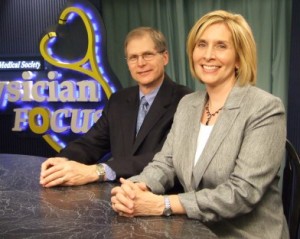By Evan Provisor, M.D., F.A.C.S., and Susan Proulx, B.S.N., R.N.

The human body has a wonderful ability to heal itself normally from bumps, bruises, injuries and sores, but certain conditions can hinder the healing process and lead to what health professionals call chronic wounds.
A chronic wound is one that does not begin to heal from conventional treatments within two weeks and is not completely healed within four weeks. Anywhere from five to eight million Americans have chronic wounds, which not only contribute to a poor quality of life, but can also lead to more serious consequences like infections and even amputation.
Several conditions can lead to these kinds of wounds: venous ulcers, usually occurring in the legs; pressure ulcers or bed sores, resulting from immobility; paraplegia and spinal cord injuries; and injuries from radiation, such as that received in cancer treatments. Problems with the body's circulatory system – the organs and tissues involved with circulating blood throughout the body – can also play a role, as does smoking, which puts carbon monoxide into the body, impairing the delivery of oxygen to tissues and thus slowing the healing process.
The highest incidence of chronic wounds, however, occurs among patients with diabetes, a disease that currently affects some 26 million people in the U.S. (And it continues to grow: nearly two million adults age 20 and older were newly diagnosed with the disease in 2010, according to the Centers for Disease Control.)
Many patients with diabetes, for example, don's feel pain, especially in their feet, so an injury from stepping on a nail or even from shoes that are too tight, might go unnoticed. These conditions can fester and form dangerous infections. (Because of this inability to feel pain, patients with diabetes should check their feet twice daily, as they may not be aware of a wound or injury. It is critically important to do this, as diabetes is a leading cause of non-traumatic lower limb amputations.)
Diabetes can affect the feet in two ways: by causing nerve damage, a condition called diabetic neuropathy, signaled by tingling or numbness in the feet; and by causing a narrowing of the blood vessels in the feet. That means less blood is flowing to the feet, which means less oxygen and nutrients are reaching the feet to fight infection and promote healing.
Chronic wounds are best cared for in a wound care center, a dedicated facility that treats these conditions beyond what a physician may be able to offer in an office. Such a facility provides ready access to physicians and nurses specializing in this type of care, as well as services tailored to the needs of individual patients. Many hospitals have established wound care centers in recent years.
Among the services these centers provide are debridement, the removal of unhealthy or dead tissue from a wound, a process that assists in faster and better healing; advanced dressing materials; temporary casts; temporary skin grafts with artificial skin; and orthotic services that can provide custom footwear, temporary foot aids, or custom inserts.
One of the state-of-the-art treatments offered at wound care centers is hyperbaric oxygen therapy. With this treatment, the patient lays inside a sealed, high-pressure chamber, breathing pure oxygen. This increases the concentration of oxygen in the bloodstream, thus promoting faster healing and lowering the risk of amputation.
Wound centers provide a comprehensive approach to care for chronic wounds, with health professionals examining vascular and circulatory issues and treating inflammation, swelling, or an infection that may need antibiotics. Further, wound center staff work with patients individually and coordinate with other agencies such as visiting nurses, should patients require that kind of additional care.
Patients, especially those with diabetes, who may have a slow-healing wound or sore should check with their primary care physician to determine if specialized treatment is needed. Our skin is the largest organ in our bodies and our first line of defense against infection, and any wound or sore, however small, should receive immediate attention.
For more information of the care of chronic wounds, including tutorials on debridement, diabetic foot care, hand washing to prevent infections, and treatment of sores, visit http://thewoundinstitute.com. For a video discussion, visit the Massachusetts Medical Society's site at www.physicianfocus.org/woundcare.
Evan Provisor, M.D., F.A.C.S. is Medical Director, and Susan Proulx, B.S.N., R.N., is Program Director of The Wound Care Center at Harrington in Charlton, part of Harrington HealthCare System based in Southbridge. Physician Focus is a public service of the Massachusetts Medical Society. Readers should use their own judgment when seeking medical care and consult with their physician for treatment. Send comments to [email protected].















